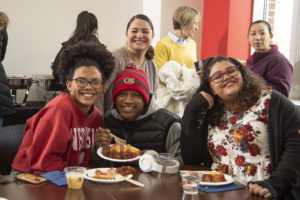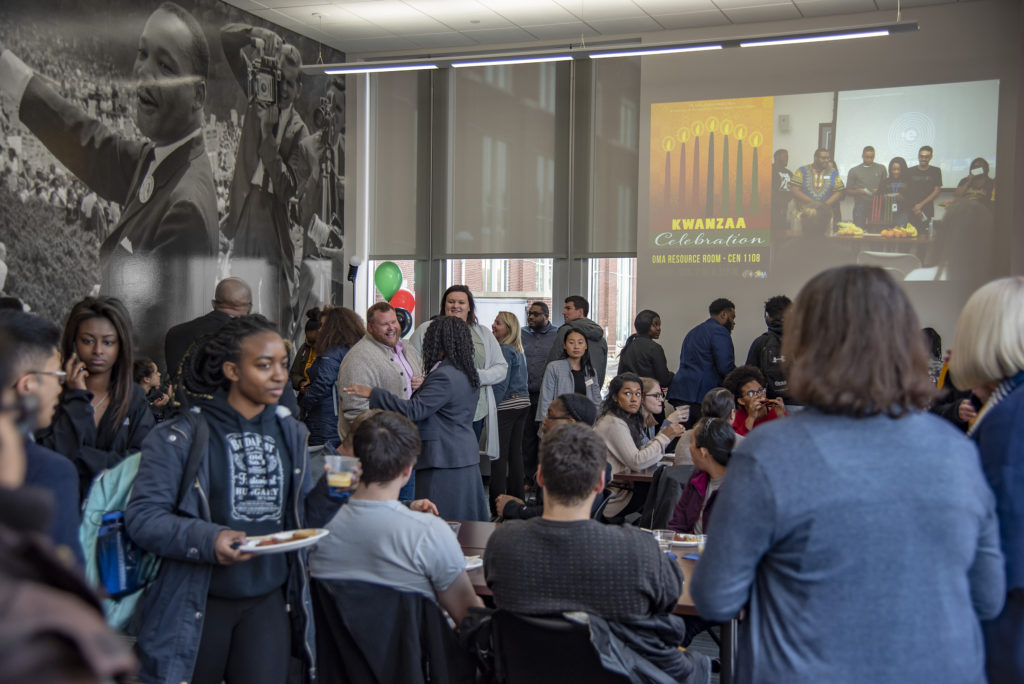In fall 2017, members of the Black Student Alliance at the University of Wisconsin-Eau Claire met with Chancellor James Schmidt and Vice Chancellor Tamara Johnson to discuss the challenges they face as black students at a predominantly white university. They shared their struggles on campus — from those experienced during classroom interactions to those in other campus settings.
They also shared ideas about what would help make their university experience better. First on their list was creating a space of their own on campus.
On Nov. 2, following months of planning that involved a network of students, faculty and staff from across the university, the students’ vision for their own space came to life when the UW-Eau Claire Black Cultural Center opened its doors. Financial support for the new center came from the Chancellor’s Office, the university’s Equity, Diversity and Inclusion and Student Affairs division, and the UW-Eau Claire Foundation.
“The university’s Black Cultural Center is a breakthrough that many of my fellow students and I have been waiting on for some time,” said Avery Benson, a sophomore creative writing major from Mount Horeb and public relations co-chair for the Black Student Alliance. “I think I can speak for all of us when I say it is a complete blessing. Not only will this space attract people of color to the UW-Eau Claire campus, but it will also provide an outlet where they can feel safe, build community and flourish in their own environment.”

Students, faculty, and staff gathered on Nov. 2 to celebrate the opening of the Black Cultural Center at UW-Eau Claire.
The new center will be the meeting place for black student organizations as well as an informal gathering and drop-in space. Located in Room 1931 of Centennial Hall, the space features moveable tables and chairs, a cork board, chalk wall, refrigerator, microwave, storage space and a screen projector. Covering an entire wall from floor to ceiling is a large image of Martin Luther King Jr. on the National Mall in Washington, D.C., after delivering his famous “I Have a Dream” speech on the steps of the Lincoln Memorial.
Dr. Tamara Johnson, UW-Eau Claire vice chancellor for equity, diversity and inclusion and student affairs, credited the Black Student Alliance members for speaking up and the campus community for responding to students’ needs.
“I commend the black students for the strength required to candidly share their unique experiences on our campus,” Johnson said. “I also am extremely proud that so many faculty, staff and students immediately responded in ways that supported the importance of taking this step as an institution to create an affirming space.”
Around the country, colleges and universities are responding to the needs of underrepresented students by creating affinity spaces — a practice that research is showing to be beneficial, said Michael Thomas, student services coordinator in UW-Eau Claire’s Office of Multicultural Affairs.
Thomas said a common misconception is that these spaces serve to segregate student populations.
“Rather, spaces like UW-Eau Claire’s new Black Cultural Center provide a real opportunity for community building and engagement, an experience that greatly contributes to underrepresented student success,” Thomas said.
Being part of a minority group that makes up only 1 percent of the student population is “extremely intimidating,” said Marinez Smith, a sophomore criminal justice major from Milwaukee and Black Student Alliance president.
“Having a safe haven like the Black Cultural Center provides a sense of belonging and refuge for the black community — not only in the physical sense, but it also shows immense support from the university,” Smith said.
Angela Pittman Taylor, a 2000 UW-Eau Claire public relations graduate who is now senior vice president and public relations operations manager with Baird in Milwaukee, said the opening of the Black Cultural Center sends a positive message to black students from the university. It also will support ongoing efforts by Taylor and her UW-Eau Claire classmates to connect with fellow black alumni and to help them engage with current students, Taylor said.
“Everybody needs a space where they feel safe, seen, heard and valued,” Taylor said. “From my perspective, the establishment of this beautiful new Black Cultural Center is a significant demonstration of just how much the university cares for these students.
“Over the past decade my classmates and I have worked with the chancellor, UW-Eau Claire Foundation, faculty and staff, the Office of Multicultural Affairs, and others to engage alumni of color with the university. Our hope is that the new Black Cultural Center will serve as a gathering place for mentoring and networking activities as we continue our efforts to provide additional guidance and support to students.”
Throughout his four years at UW-Eau Claire, Larrick Potvin, a senior social work major from Brooklyn Center, Minnesota, and Black Student Alliance facilitator, said he and fellow black students have experienced feelings of being left out and not belonging. But he also is noticing an increase in the number of black students on campus and is encouraged by the creation of the Black Cultural Center.
“Our numbers continue to grow and we are becoming a bigger family every day,” Potvin said. “This space not only allows us to feel safe, but allows our creativity to flourish and to show future black students that this is a place they can call home.”

